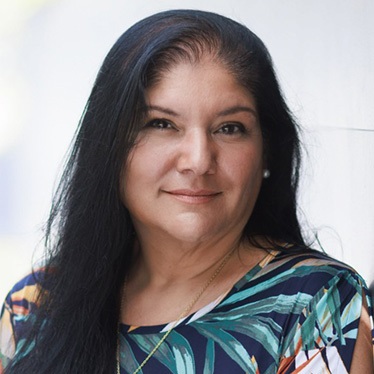Humphrey Fellows Help Connect Internet Backpack Project to Central America
July 26, 2022
When 2021-22 Hubert H. Humphrey Fellow Marien Alvarado returned to her native Guatemala this spring, she resumed a daily frustration at least half the world's population experiences: unreliable internet access.

“Back in the U.S., my connection was 5G. Now that I am here, I am facing the challenges of not being able to connect,” she said. It took several days to find Wi-Fi reliable enough to read and respond to emailed questions, and during a WhatsApp call from her home in a village near Antigua, a major Latin American city, her phone’s video was fuzzy and cut in and out.
Understanding the problem made her a good fit to work on a project the iSchool’s Lee McKnight has been working on for decades. McKnight co-invented the Internet Backpack as a shared community hotspot for use during emergencies. First distributed in 2017, the backpack holds a satellite, antenna, two cellphones, Wi-Fi, router, solar panel and battery.
“With this, you can connect virtually everywhere,” McKnight said. “It’s in a dozen countries, but it’s early.” Testing is ongoing, and the team is eager to expand the backpack to other countries.
Alvarado, previously a project specialist with the Finance Ministry of Guatemala, is one of several 2021-22 Humphrey Fellows who worked on internet governance and digital transformation issues, participating in the iSchool student group WiTec, or Worldwide Innovation Technology, and a Humphrey Fellows digital transformation task force with members from six campuses and 12 countries.
As a research intern for McKnight and Danielle Smith, professor of African American studies in the College of Arts and Sciences and director of the Renée Crown University Honors Program, Alvarado facilitated meetings with Guatemalan government officials and introductions to non-governmental organizations working in Guatemala.
“It’s not polite to show up without interacting with the government,” McKnight said. “That’s just where the Humphrey fellows’ expertise comes in.”
She also worked with Smith on an Internet Society Foundation project to bring the backpack to Costa Rica.
Smith, who is project lead, and McKnight introduced the backpack to four Costa Rican communities in May. “The government of Costa Rica could not get connectivity to one community for six years,” McKnight said. “We got it up and going.”
2021-2022 Humphrey Fellow Mphatso (Vanessa) Gunda, with experience as a systems analyst for Malawi's parliament, also worked with Smith. In December she represented the backpack project at a United Nations Internet Governance Forum in Katowice, Poland. She participated in discussions on meaningful digital connectivity and usability in developing countries, digital inclusion, digital public infrastructure and emerging regulation.
Although the backpack's technology works, challenges in spreading its use remain. The per-minute cost is high, further testing and data collection is needed in Costa Rica, and the team needs to continue building relationships with leaders in remote communities in Central America.
“For people off the grid, just being able to send a text message or a WhatsApp message is huge,” McKnight said.
Syracuse's 2021-22 Humphrey Fellows recently completed their 10-month fellowship at the Maxwell School, participating in graduate study, professional development and cultural exchange.
The iSchool-Maxwell collaboration was a perfect match between technology and policy and reflected the interdisciplinary and geographic collaboration prized both by Syracuse and the Humphrey program.
The backpack project's potential was highlighted during quarantine and travel restrictions of the pandemic. “Kids in these remote areas are losing years of education because of COVID. We're just a drop in the bucket," McKnight said. “But with the Humphrey Fellows we made a little progress. The uses and applications and policy models that are in the Humphrey Fellows sweet spot. They see the potential for real-world impact."
Alvarado is eager to see the backpack introduced in Guatemala and Honduras, where she maintains connections with government and foundation officials. “It’s not just a research project, but going to the field and implementing something real,” she said. “This will improve the access to information, and can be used in health, education, even in economic development.”
Related News
School News

Dec 19, 2024
School News

Dec 11, 2024
School News

Dec 10, 2024
